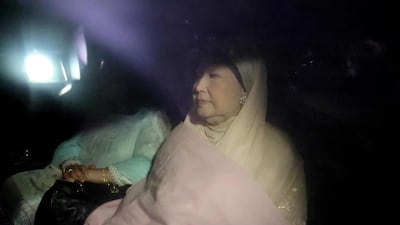Former two-time Bangladeshi prime minister Khaleda Zia has left the nation for the first time in seven years for medical treatment in London after being released from house arrest following her rival Sheikh Hasina’s resignation last year.
Ms Zia, 79, chairwoman of the Bangladesh Nationalist Party, was the country's first female prime minister but was convicted in graft cases in 2018 under Ms Hasina’s government.
She left the capital Dhaka on a special royal air ambulance sent by Qatari Emir Sheikh Tamim, one of her advisers Zahiruddin Swapan told the media.
A team of local and Qatari doctors, family members, and other staff accompanied the leader on the flight. She would be seeking treatment at a London clinic. State news agency Bangladesh Sangbad Sangstha quoted her doctors as saying that her treatment in London was expected to take a few months.
Thousands of her supporters gathered outside her house in Dhaka’s Gulshan area, turning the 10km journey to the airport into three hours. Her departure was broadcast live on television.
Ms Zia served as the country’s first female prime minister between 1991 and 1996, followed by another five-year term from 2001 to 2006.
However, she was charged with dozens of corruption cases in the following years, including under the three-year military rule from 2006 and during her rival Ms Hasina’s 16-year term. She was convicted in two cases of corruption in 2018 and was sentenced to a 17-year jail term.
Ms Zia served two years in Dhaka jail until 2020 when she was released during Covid-19 pandemic. The courts later suspended her sentence over her poor health but she remained under house arrest in Dhaka.
She was acquitted by the interim government of Nobel laureate Muhammad Yunus in some of the cases while at least seven cases are pending before the courts.

She has been diagnosed with liver cirrhosis, heart disease and kidney ailments and last visited London in 2017 for treatment and to see her self-exiled son, politician Tarique Rahman.
Ms Zia has maintained that the cases against her were politically motivated. She had asked the Hasina administration to allow her to the treatment abroad, which she claimed was never approved.
The former prime minister has been one of the central figures in the country’s politics but was largely sidelined during the rule of rival Ms Hasina, who fled to India in August last year when thousands of protesters stormed her residence in Dhaka during a student-led civil agitation that left hundreds of people dead.
Ms Zia’s departure from the country comes at a time when the country is in a political transition and slated for big-ticket reforms under the interim government of Dr Yunus.
The BNP has been pushing for elections to be held in December this year, with Mr Rahman, expected to return to the country to lead the party in the national elections that political commentators say will go in the favour of the BNP after a 15-year-long ironclad rule of Ms Hasina's Awami League government.


